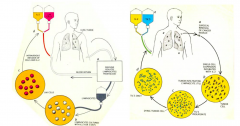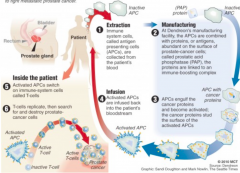![]()
![]()
![]()
Use LEFT and RIGHT arrow keys to navigate between flashcards;
Use UP and DOWN arrow keys to flip the card;
H to show hint;
A reads text to speech;
9 Cards in this Set
- Front
- Back
|
Describe briefly the experiment that showed that tumors can induce protective immune responses?
|
Mouse with sarcoma. If this tumor, call it tumor A, is resected and transplanted into a normal mouse of the same strain, the mouse will develop a tumor. However, the original host that was cured by surgical removal of the tumor, will reject subsequent transplant on the same tumor. Injection of killed cells from the same tumor will induce protective immunity to that tumor, but same doesn't apply to another tumor. Also, immunity to tumor can be transferred to another animal by CD8+ T lymphocytes. Take home: it is specific to that tumor
|
|
|
What are the four types of tumor antigens?
|
1) mutated versions of normal cellular proteins that are unrelated to the malignant phenotype
2) mutated versions of normal cellular proteins that are related to the malignant phenotype 3) products of genes that are normally expressed at low levels and to which immune responses are present, but that are overexpressed in the tumor cells 4) proteins encoded by oncogenic viruses |
|
|
What are the four immune mechanisms that can contribute to the elimination of tumors? Describe their targets.
|
1) Cytotoxic T lymphocytes (CTL): These cells are directed against MHC class 1-bound antigens expressed by tumors. CTLs are main effector cells that mediate the elimination of tumors.
2) NK cells kills tumor cells that express low levels of MHC Class I molecules, and can kill cells that are coated with IgG antibodies via ADCC 3) Antibodies. Those directed against tumor antigens. 4) Macrophages. These phagocytose opsonized tumor cells, and can kill tumor cells by production of TNF. Cytokines produced by TH1 cells may recruit macrophages to the tumor |
|
|
What are the three ways tumors have developed to escape attack by the immune system?
|
1) Low immunogenicity. Tumor cells often do not express adhesion molecules, MHC class I or class II molecules, tumor-specific antigens, or co-stimulatory molecules
2) Antigenic modulation. Tumor cells may lose antigens that the immune system can recognize due to mutations. 3) Immunosuppression. Tumors often secrete factors such as TGF-beta, which suppress immune responses |
|
|
What are the three ways anti-tumor immunity may be enhanced non-specifically?
|
1) Pro-inflammatory stimuli. BCG vaccine to treat bladder cancer.
2) Recombinant cytokines. IL-2 has been approved for treatment of melanoma and renal cell carcinoma 3) Blockade of inhibitory pathways. Antibodies directed against inhibitory molecules such as CTLA-4 or PD-1 |
|
|
What are the three strategies for using tumor-specific antibodies
|
-Only the antibody binds to tumor cell
-Antibody-toxin conjugates bind to tumor cell -Radioactive antibody binds to the tumor cell |
|
|
What are the cell based approaches for cancer therapy?
|

-Lymphokine activated killer (LAK) cells. Add in IL-2 to peripheral lymphocytes and get NK cells. inject NK cells with more IL-2.
-tumor infiltrating lymphocytes (TIL). Inject tumor infiltrating lymphocytes with IL-2. |
|
|
What are the vaccine based approaches against tumors?
|
-Vaccinate patients with tumor antigens specific to the tumor
-Inject killed tumor cells together with non-specific adjuvants -transfection of the tumor cells with genes encoding co-stimulatory molecules such as B7, or with genes encoding cytokines -enhance immunogenicity of tumors |
|
|
What are the approaches to enhance immunogenicity of tumors?
|

-Transfection of tumor cells with genes encoding co-stimulatory molecules such as B7, or with genes encoding cytokines. B7 tumor cells will then be able to stimulate naive T cells and elicit cytotoxic T lymphocyte responses. Local production of cytokines may augment specific T cell responses against tumor antigens
-Vaccine based on pulsing dendritic cells with prostate-derived antigens |

